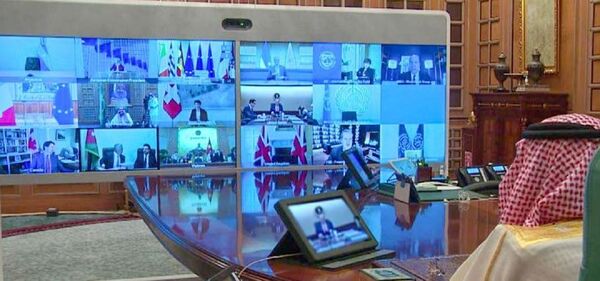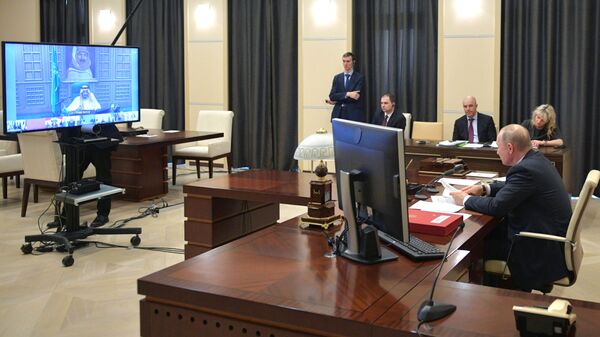Leaders of the world's top 20 biggest economies have pledged to work together to close the financing gap in the World Health Organization's strategic preparedness and response plan to deal with the COVID-19 outbreak, issuing a joint statement on the collective measures they will take on Thursday.
Speaking at the summit, Russian President Vladimir Putin stressed that now more than ever, the world needs 'green corridors' free of trade wars and sanctions for the provision of medical supplies, food, equipment and technologies. He noted that the world cannot afford to act in an "every man for himself" manner amid the pandemic.
"It appears that the current problems associated with the COVID-19 pandemic will result in more serious shocks than the financial crisis of 2008-2009, with trade conflicts and sanctions exacerbating the recession," Putin said. "In our view, the key risk is long-term unemployment, the peak of which will exceed 2009 levels under any scenario. The dynamics of unemployment will also be a key indicator of the effectiveness of our anti-crisis measures," he added.
Putin also called for a common plan of measures to restore the economy amid the crisis, proposing a special fund under the aegis of the International Monetary Fund from which any G20 member may draw.
"Right now it's extremely important to ensure access to financing for countries which need resources, especially bearing in mind those countries which have been affected by this crisis and pandemic," Putin said.
The Russian president also suggested that the crisis has shown that international organizations don't have the necessary tools to enable them to act quickly to stabilize the situation in the event of a crisis, and that they should be reorganized to make them more responsive in acting automatically in crisis situations.
On the medical front, the Russian president said joint research efforts by all G20 nations would speed the creation of a vaccine. He urged countries to increase the sharing of accurate information on the pandemic.
Saudi King Salman, whose country is chairing the G20 presidency this year, called for "effective and coordinated" measures to be taken immediately to respond to the global health and economic crisis caused by the virus.
"This human crisis requires a global response. The world counts on us to come together and cooperate in order to face this challenge. We must have an effective and coordinated response to this pandemic and restore confidence in the global economy," Salman said.

Joint Statement
In a joint statement issued following the summit, the G20 committed members to take the necessary measures to ensure adequate funding to contain the pandemic and protect citizens, promising to do "whatever it takes" to overcome the threat. The group of countries pledged to increase production capacity of medical supplies, and said that tackling the virus's impact on public health, society and the economy was the G20's "absolute priority."
G20 leaders promised to assist all countries in need in the fight against COVID-19, and committed to working together to increase R&D funding for vaccines and other medicines. Joint efforts are expected to include sharing of epidemiological and health data, as well as sharing best practices proven to work in fighting the virus, and the strengthening of international scientific cooperation.
Nations agreed to strengthen the WHO's mandate in coordinating the global fight against the coronavirus, and to strengthen national, regional and global capabilities on responding to infectious diseases.
"We fully support and commit to further strengthen the WHO's mandate in coordinating the international fight against the pandemic, including the protection of front-line health workers, delivery of medical supplies, especially diagnostic tools, treatments, medicines, and vaccines," the joint statement notes.
On the economic front, the G20 statement said leaders would ask finance ministers and central bank authorities to coordinate regularly with international authorities to come up with an action plan. According to the G20, countries will inject nearly $5 trillion into the global economy "as part of targeted fiscal policy, economic measures, and guarantee schemes to counteract the social, economic and financial impacts of the pandemic."


